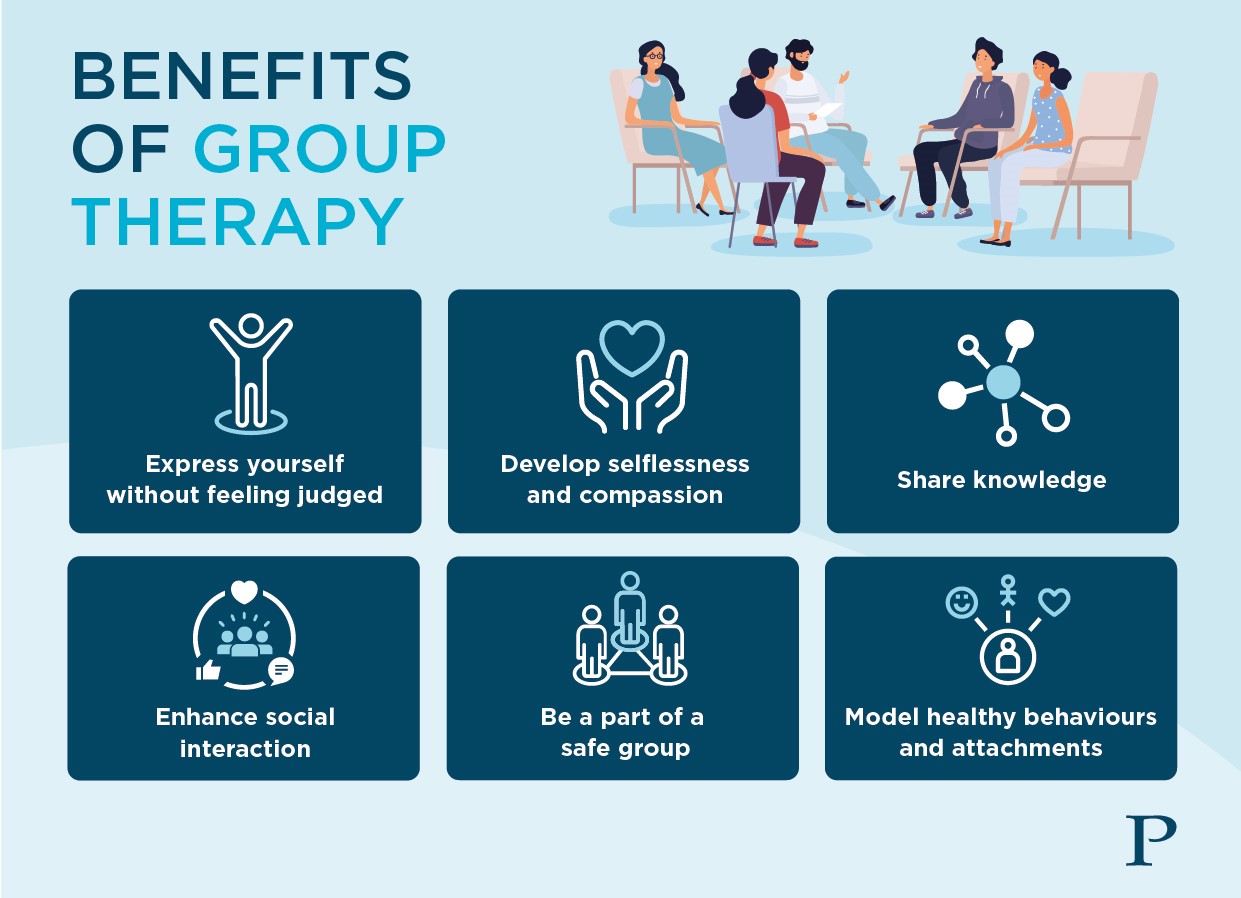Private group therapy
- Highly qualified specialists
- Evidence-based treatment
- Face-to-face appointments
Group therapy is a type of therapy that treats multiple people at once. The people being treated within the group will all be experiencing similar problems or share similar diagnoses.
This form of therapy is evidence-based has been found to be highly effective in the treatment of a wide range of mental health challenges including depression, anxiety, stress, post-traumatic stress disorder (PTSD), addictions and eating disorders.
During group therapy, group members are encouraged to share their experiences and insights in a supportive and trusting environment. This offers people different perspectives on problems relating to mental health and addiction. It also provides opportunities to receive feedback and support from other members of the group, in a safe environment. This experience supports people to develop greater self-awareness and understanding of their own personal challenges.
Some people may find the thought of discussing their life experiences with a group of strangers to be quite daunting. However, the lead therapist will ensure that you're given enough time to get to know your peers and hear their experiences, allowing you to build a level of trust. Participation in our group sessions often helps people to realise that they're not alone and this experience develops a sense of strength, closeness and support between group members.
During a group session, you'll be encouraged to share your experiences and work on understanding yourself in a compassionate and therapeutic environment.

Research shows that groups are just as effective as one-to-one therapy. Other positive outcomes include:
Interestingly, people often express an initial reluctance for group therapy but go on to enjoy it. For people who have received both group and individual therapy, they are often surprised by their preference for group treatments.
The way in which a group session is delivered depends on the type of therapy involved.
Types of group therapy include:
Group DBT is proven to be effective for emotionally unstable personality disorder (EUPD).
Group therapies used at Priory are evidence-based and work in accordance with National Institute for Health and Care Excellence (NICE) guidelines. However, we also use additional treatment modalities which we have found to be clinically helpful. They include:
These types of group therapy can help people to express their feelings through role play. This more imaginative form of therapy is often used to treat addictions.
Group therapy sessions usually consist of between 6 to 12 people and are facilitated by a therapist and a co-therapist. Each session typically lasts for between 1 and a half, to 2 and a half hours, with a break in the middle.
The frequency, number of sessions and the type of therapy that's used within a group therapy programme, depends on the mental health problems that you're struggling with, as well as your unique needs.
Therapy groups may be 'open', meaning that people can enter at any time. They can also be 'closed', meaning that a set number of people enter the group therapy and no other members can be added to the group without the agreement of group members.
Private group therapy forms a major part of the treatment process at Priory. This format of therapy is offered as part of Priory’s comprehensive mental health inpatient treatment programmes, and also forms the basis of our intensive residential addiction treatment programmes.
Private group therapy can also take place during day care and outpatient treatment at Priory, depending on your unique needs and requirements.
At Priory, we employ highly trained, registered and accredited professionals who uphold strict ethical standards and professional boundaries. Our specialists undergo rigorous screening and comprehensive onboarding processes, ensuring exceptional care, expertise and the highest standards of professional integrity.
We ensure that our specialists have met stringent educational and training standards, and are fully qualified to practise within their specific therapeutic fields, whilst adhering to strict codes of conduct, ethics and continuous professional development (CPD).
In addition, all of our specialists are qualified under a range of professional bodies, including the Health and Care Professions Council (HCPC), the British Association for Counselling and Psychotherapy (BACP), the British Association for Behavioural and Cognitive Psychotherapies (BABCP) and the United Kingdom Council for Psychotherapy (UKCP). As such, when you receive treatment at Priory, you can be reassured that your care is being provided by knowledgeable and competent professionals, who are held accountable to recognised industry standards.